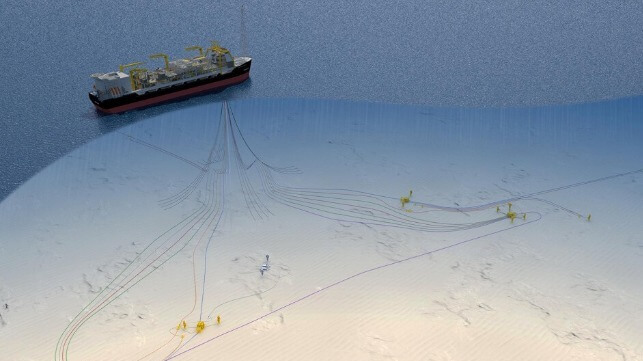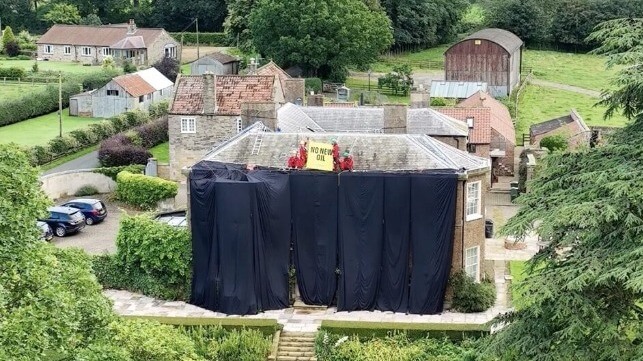UK's New Plan to "Max Out" Offshore Oil and Gas Could Impact MPAs

A week after the UK government announced plans to "max out" new oil and gas licenses in the North Sea, a group of environmental activists want the decision to be reconsidered because of its potential impact on local marine life.
In an open letter sent to Prime Minister Rishi Sunak on Friday, a group of environmental NGOs said granting the oil and gas licenses would obliterate the UK’s climate commitments, as well as exacerbate harmful impacts in the UK’s own seas. The group included over 30 organizations led by NGOs Oceana, Uplift and Blue Marine Foundation, among others.
“Approximately 40 percent of the area under consideration (96 of the areas within the 115 licenses) sit either partially or completely within Special Protected Areas. To license these would make a mockery of the concept of ‘marine protected areas’ at its basic level and undermine efforts to make these sites genuinely of benefit to marine conservation,” noted the letter to the Prime Minister.
In addition, the UK is party to the Kunming-Montreal agreement adopted last year, which calls for protection of at least 30 percent of the land and ocean by 2030. Allowing additional oil and gas licenses would undermine the UK’s lead position in the march towards a carbon neutral future, according to the environmental campaigners.
Rishi Sunak has defended his backing for the North Sea Oil and gas industry, arguing it is part of his efforts to make Britain more energy independent.
“Even when we’ve reached net zero in 2050, a quarter of our energy needs will come from oil and gas. We’re choosing to power up Britain from Britain and invest in crucial industries such as carbon capture and storage, rather than depend on overseas gas imports,” said the Prime Minister.
While the UK government is convinced that new oil and gas fields will deliver energy security, some experts believe it will have a minimal impact.
A recent analysis of government data by the environmental campaign group Uplift found that new fields would supply at most an additional three weeks of gas a year to the UK, from 2024 to 2050, even if none of the gas was exported.
Over the same period, new oilfields would supply at most about five years of oil demand, if none was exported. But in reality, UK currently exports about 80 percent of the oil produced in the North Sea.
“The licensing of new oil and gas fields in and around marine protected areas is a wanton act of environmental vandalism, ignoring both the government’s commitment to tackle climate change and protect nature,” said Hugo Tagholm,” Vice President of Oceana in the UK.
Some of the Marine Protected Areas (MPA) that could be impacted by the new fields include the North Norfolk Coast Special Protected Area, the Foula MPA off the coast of Shetland and the Southern North Sea MPA.
Activists Climb UK Prime Minister's House to Protest Offshore Drilling

On Thursday morning, activists with Greenpeace climbed onto the roof of UK Prime Minister Rishi Sunak's house in protest of his decision to "max out" oil and gas leasing on the UK continental shelf.
The team of four protesters went to Sunak's private home in North Yorkshire and scaled the exterior, perching on the slate roof with a sign calling for "no new oil." They draped the front facade of the house in black fabric and stayed for hours before the local police came to arrest them. The activists were detained and may face charges for the episode.
Sunak lives in London at 10 Downing Street, the prime minister's residence, and was on vacation in the U.S. with his family at the time of the action.
“It really was about this image of pouring oil all over the prime minister's house,” Greenpeace campaigner Ami McCarthy told the New York Times. She added that the team had encountered no security presence at Sunak's $2 million home and simply walked onto the property.
Last week, Sunak announced plans to approve more than 100 new offshore oil and gas licenses as part of a policy of "maxing out" Britain's energy reserves. He said that the license approvals would include a green light for the controversial Rosebank oil field, which has been targeted by environmental campaigners. Sunak asserted that the new oil and gas license activity would be consistent with the UK's net-zero commitments.
"My view is we should max out the opportunities that we have here in the North Sea, because that’s good for our energy security," Sunak said. "It’s also good for the climate because the alternative is shipping energy here from halfway around the world."
No comments:
Post a Comment